Unit 6 Disaster and hope Understanding ideas课件(共42张PPT)-高中英语外研版(2019)必修第三册
文档属性
| 名称 | Unit 6 Disaster and hope Understanding ideas课件(共42张PPT)-高中英语外研版(2019)必修第三册 | 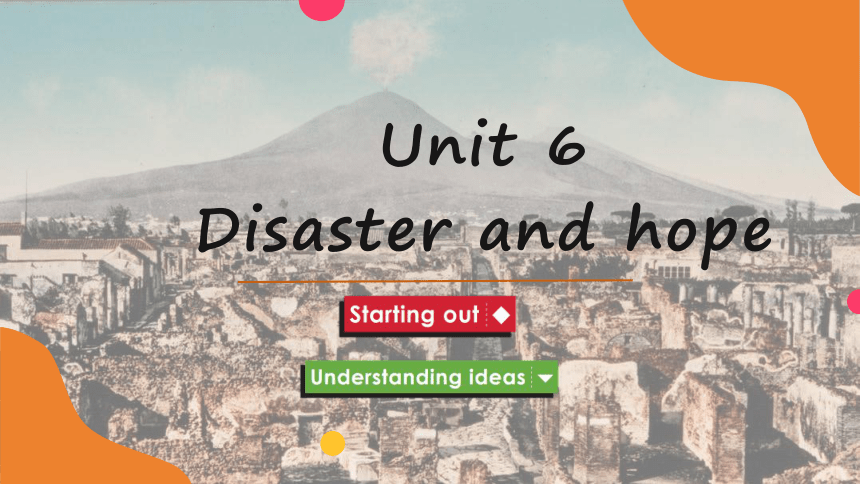 | |
| 格式 | pptx | ||
| 文件大小 | 37.7MB | ||
| 资源类型 | 教案 | ||
| 版本资源 | 外研版(2019) | ||
| 科目 | 英语 | ||
| 更新时间 | 2025-04-03 22:14:13 | ||
图片预览


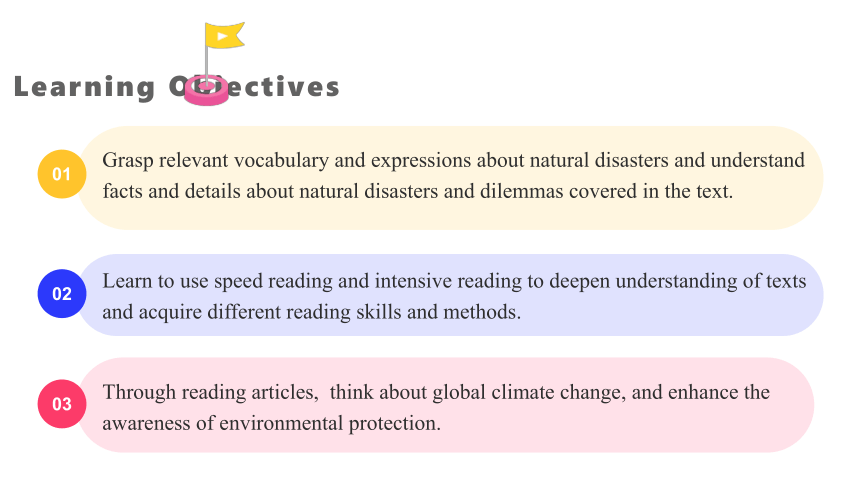
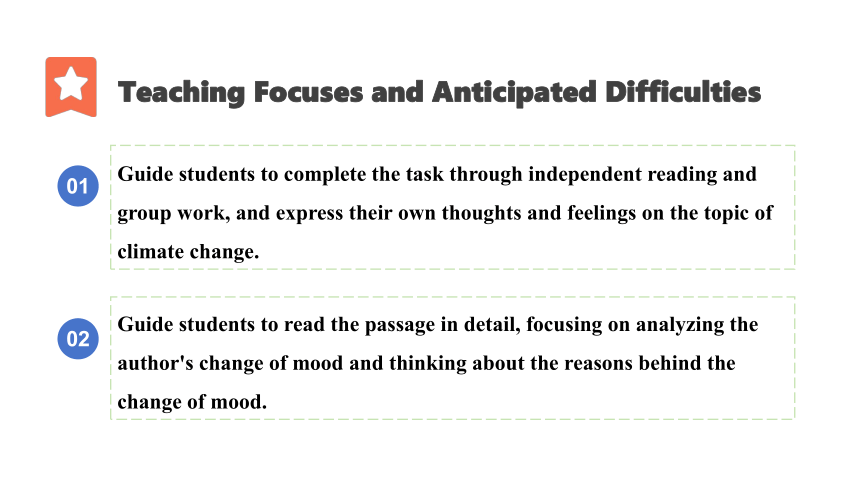

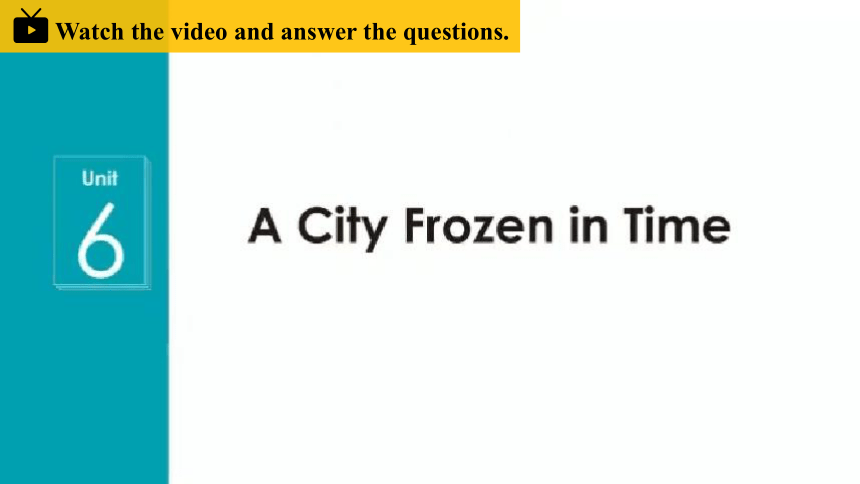
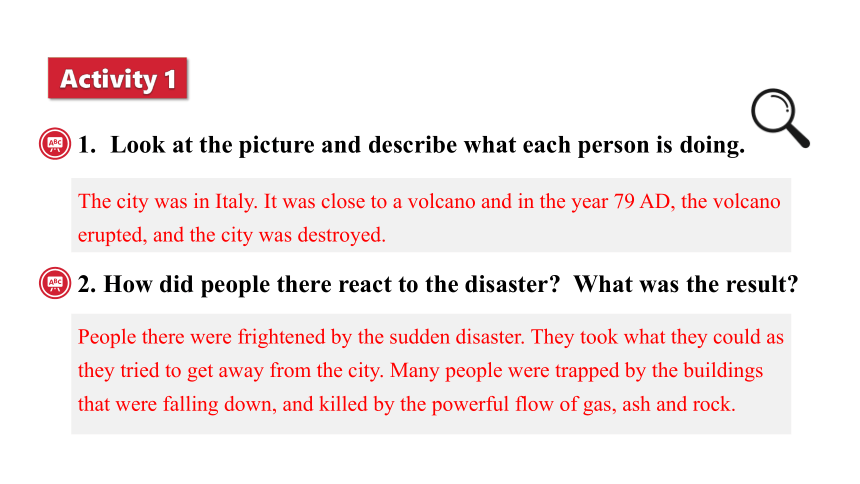
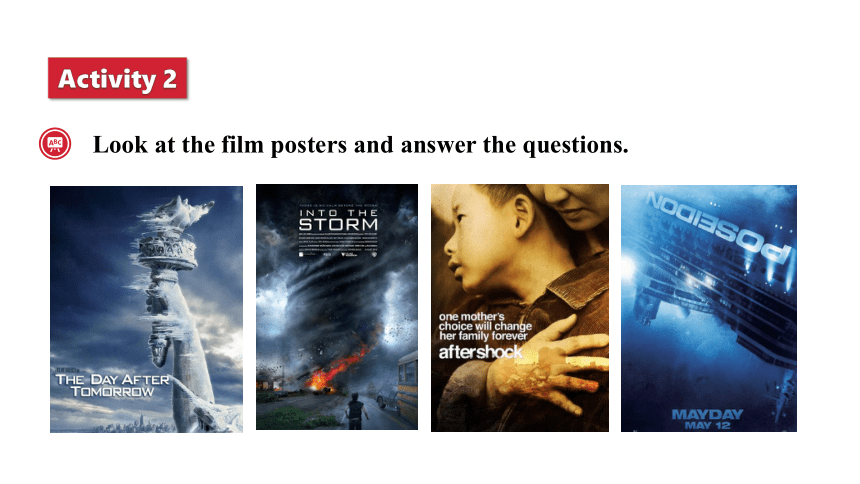
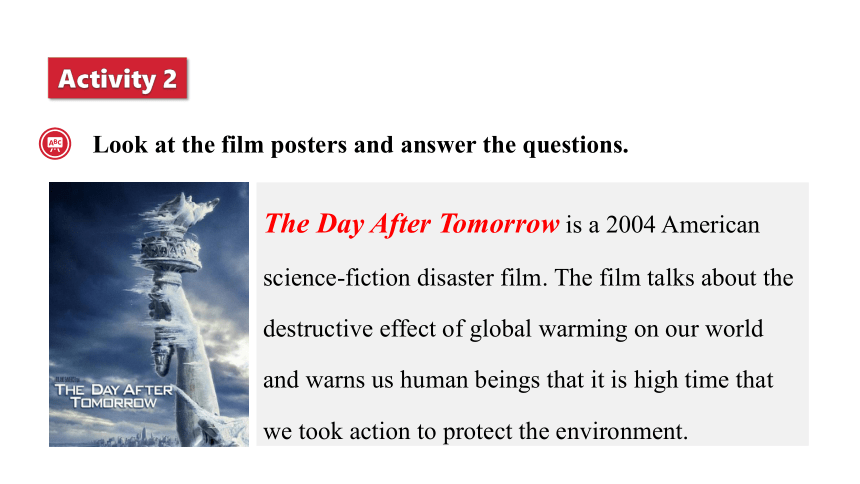
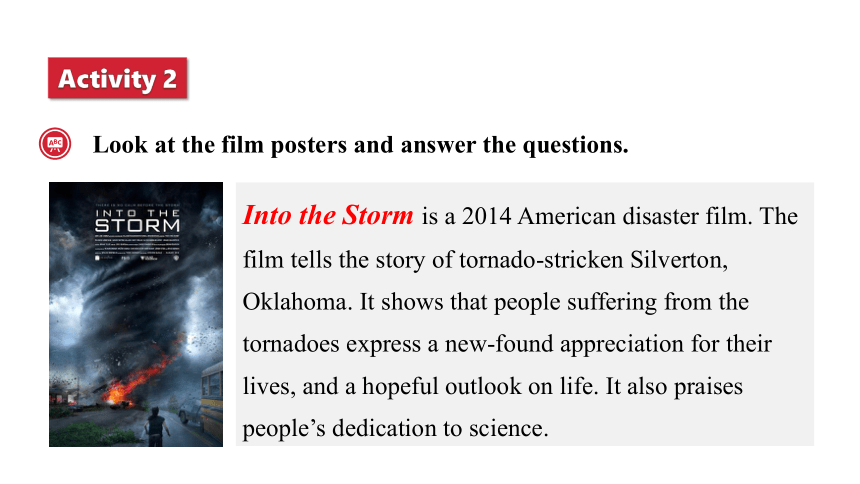
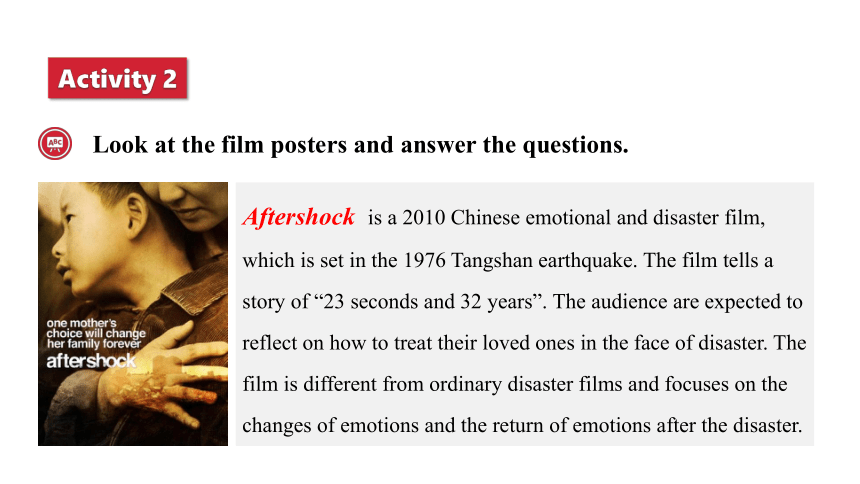
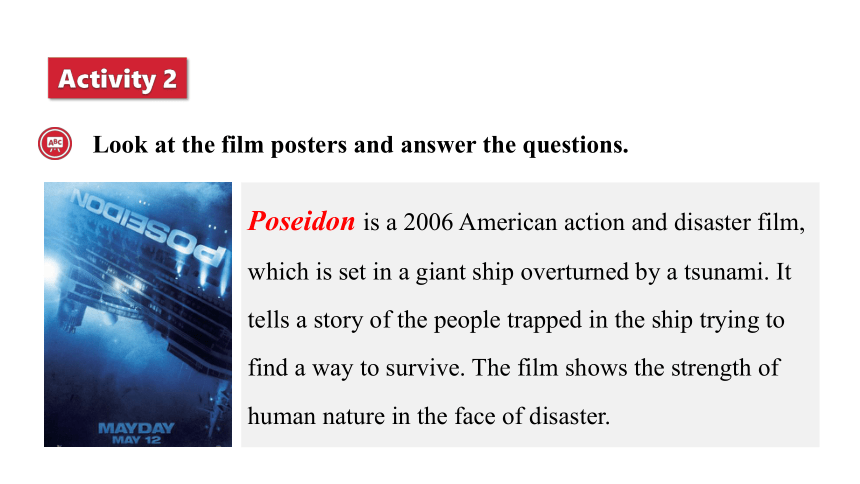
文档简介
(共42张PPT)
Unit 6
Disaster and hope
Learning Objectives
01
Learning Objectives
01
Grasp relevant vocabulary and expressions about natural disasters and understand facts and details about natural disasters and dilemmas covered in the text.
03
Through reading articles, think about global climate change, and enhance the awareness of environmental protection.
02
Learn to use speed reading and intensive reading to deepen understanding of texts and acquire different reading skills and methods.
Guide students to complete the task through independent reading and group work, and express their own thoughts and feelings on the topic of climate change.
Guide students to read the passage in detail, focusing on analyzing the author's change of mood and thinking about the reasons behind the change of mood.
01
02
Teaching Focuses and Anticipated Difficulties
What kinds of natural disasters do you know
earthquake
tornado
wildfire
drought
landslide
typhoon
Watch the video and answer the questions.
Activity 1
Look at the picture and describe what each person is doing.
The city was in Italy. It was close to a volcano and in the year 79 AD, the volcano erupted, and the city was destroyed.
2. How did people there react to the disaster What was the result
People there were frightened by the sudden disaster. They took what they could as they tried to get away from the city. Many people were trapped by the buildings that were falling down, and killed by the powerful flow of gas, ash and rock.
Activity 2
Look at the film posters and answer the questions.
Activity 2
Look at the film posters and answer the questions.
The Day After Tomorrow is a 2004 American science-fiction disaster film. The film talks about the destructive effect of global warming on our world and warns us human beings that it is high time that we took action to protect the environment.
Activity 2
Look at the film posters and answer the questions.
Into the Storm is a 2014 American disaster film. The film tells the story of tornado-stricken Silverton, Oklahoma. It shows that people suffering from the tornadoes express a new-found appreciation for their lives, and a hopeful outlook on life. It also praises people’s dedication to science.
Activity 2
Look at the film posters and answer the questions.
Aftershock is a 2010 Chinese emotional and disaster film, which is set in the 1976 Tangshan earthquake. The film tells a story of “23 seconds and 32 years”. The audience are expected to reflect on how to treat their loved ones in the face of disaster. The film is different from ordinary disaster films and focuses on the changes of emotions and the return of emotions after the disaster.
Activity 2
Look at the film posters and answer the questions.
Poseidon is a 2006 American action and disaster film, which is set in a giant ship overturned by a tsunami. It tells a story of the people trapped in the ship trying to find a way to survive. The film shows the strength of human nature in the face of disaster.
Activity 2
2. What do you think the main characters do in the face of these disasters
People is likely to reflect their behaviors in critical situation. True love, relationship between families, couples, strangers, is the theme of the movies. Moreover, people are full of hope instead of depression.
3. What other stories do you know about natural disasters Share an example with the class.
Activity 1
Look at the thermometer and answer the questions.
1. What happens when the temperature goes very high How do people deal with extreme temperatures
The first scourge (天灾) of warming is drought. Forest fires are common. In areas near the equator, heavy rain, flash floods, mudslides, mountain collapse will be frequent.
Activity 1
Look at the thermometer and answer the questions.
2. What happens when the temperature goes very low How do you feel in extreme temperatures
The amount of land available to grow food will decrease, and crops will be reduced due to lack of heat.
There will be terrible famines and wars over food.
Activity 1
What happens when the temperature goes very high or very low
extreme low temperature
extreme high temperature
cold wave
snowstorm
reduction in crop production (谷物产量下降)
famine(饥荒)
war
heat wave
drought
forest fire
heavy rains
flood
mudslide
Activity 2
Look at the picture and predict what the passage is about.
Then read the passage and check your prediction.
Hot! Hot! Hot!
tube
crowded
temperature
Vocabulary
02
1. compare
compare...with/to/and... 将…与…相比
compared with/to... 与……相比
compare with.. 可与……相提并论,比得上……
comparison n.比较;对比
by/in comparison with.. 与…相比较
bycomparison 比较起来,较之
练习:有些人把书比作朋友。
_________________________________
Some people compare books to friends.
2. look through
look forward to 期待,盼望
look back on 回忆,回顾
look out (for) 当心
look down onupon 轻视,瞧不起
look up 查阅;抬头向上看
look into 调查
练习:
他浏览报纸,发现了一些有用的信息。 _____________________________________________________________
He looked through the newspapers and found some useful information.
3. occur
occurto sb. 被想到,出现在头脑中
It occurs to sb.that... 某人想到…...
(It作形式主语,that引导的从句为真正的主语,且that不能省略)
练习:
我想起我把伞忘在楼上_______________________________________________
It occurred to me that I had left my umbrella upstairs.
Activity 2
Look at the picture and predict what the passage is about.
Then read the passage and check your prediction.
Hot! Hot! Hot!
The passage is about the author’s feelings and concerns on the London Tube on an unusually hot day.
Read the text and match the main idea.
A. There are many disasters in the world.
B. It is hot at the Tube station.
C. The author arrives at his destination.
D. It is even hotter in the train.
Paragraph 1
Paragraph 2
Paragraph 3
Paragraph 4
Paragraph 5
E. The author is worried about a flood.
At the Tube station
On the
platform
inside the
train
Out of the
station
Feelings
awful
no air conditioning
on one of the oldest and deepest lines
hot
...., like jumping into a volcano
sick
wear a suit and in a crowd of passengers;
have bacon and eggs for breakfast
scared
Each summer seems hotter than the last
shock& nervous
photes and news showing a lot of disasters
refreshed
I suddenly feel a fresh wind on my face
Read the passage again.
Choose the best answer accordingto the text.
1 What does the passage mainly talk about
A. Journey in London. B. The Tube system in London.
C. Crowded situation. D. The extreme weather conditions.
Read the passage again.
Choose the best answer accordingto the text.
2 What do we know about the Central Line in London
A. It was built earlier than most of the other lines.
B. The air conditioning was invented earlier than it.
C. Going down on the stairs is hard for the passengers.
D. It was the hottest and deepest on the world's Tube system.
Read the passage again.
Choose the best answer accordingto the text.
3 Why does the author feel uncomfortable in the Tube
A. Because he is wearing a suit today.
B. Because he had special food for breakfast.
C. Because he can make it to Bank station soon.
D. Because there are many people and much hot air.
Read the passage again.
Choose the best answer accordingto the text.
4 Which of the following doesn’t belong to the author’s preparations for the future
A. Move the flat to another city.
B. Buy a boat.
C. Move the office to the top floor.
D. Learn to swim.
Read the passage again.
Choose the best answer accordingto the text.
5 How does the author feel about the reports of natural disasters around the world
A. Excited. B. Relaxed.
C. Shocked. D. Embarrassed.
6 Why does the author feel good after walking out of the Tube
A. Because he has been worrying too much.
B. Because he is moving to space.
C. Because he feels cooler outside.
D. Because his destination is here now.
Activity 3
Choose the author’s purpose in writing the passage.
1 To explain why summers in London are getting hotter and hotter.
2 To complain about the London Tube.
3 To warn people about the danger of London being flooded.
4 To express his worries about the dangers of extreme weather conditions.
Activity 4
Complete the flow chart with words and expressions from the passage.
The author is travelling on the London Tube. It is very hot and the temperature outside will be 1 ____________________________. He feels awful.
30 plus degrees/ over 30 degrees
It is even hotter inside the train than outside, and the author thinks he is 2 __________________________with the passenger next to him.
melting and becoming one
Thinking that London will probably get hotter, the author feels 3 ________________. To prepare for the future, he thinks he should:
4. ________________________
________________________
5. ________________________
________________________
6. ________________________
Activity 4
a bit scared
put his flat on the market and buy a boat
speak with his manager about moving to the top floor
learn to swim
In the newspaper, there are reports of natural disasters around the world caused by 7 _________________, which makes the author feel 8 ______________.
climate change
nervous
Going outside, the author feels refreshed and realizes he has been 9._______________.
worrying too much
What were the highest and lowest temperatures recorded where you
live
where 引导的地点状语从句
where引导地点状语从句时为从属连词,在从句中作状语,意为"在……的地方。"where引导的地点状语从句用于对主句中的谓语动词进行说明,where前面没有表示地点的名词。where引导的地点状语从句可置于主句之前,也可置于主句之后。
where引导的地点状语从句
where 为从属连词。where 引导的地点状语从句用于对主句中的谓语动词进行说明,
where 前面没有表示地点的名词。
The school was built where there had once been a park.
学校建在一座公园的旧址。
where 引导的定语从句 vs where引导的地点状语从句
where引导的定语从句
where 为关系副词,在定语从句中作地点状语,其前有一个表示地点的先行词。此时,where可以换成"介词+which"结构。
Is there a shop around where( =in which)we can buy some fruit
附近有没有一家我们可以买到一些水果的商店
Now that it’s hard to avoid a disaster on Earth, perhaps I should start thinking about moving to space...
now that 引导的原因状语从句
now that 引|导原因状语从句时,意为"既然,由于",相当于since。
now that引导的从句通常表示显而易见的原因,语气较弱,从句通常位于主句之前。
Now that we've come to Beijing, let's visit the Palace Museum.
我们既然来北京了,就参观一下故宫博物院吧。
Well, maybe I have been worrying too much.
现在完成进行时
现在完成进行时由"have/has+been+现在分词"构成
(1) 表示某一动作从过去某个时间开始一直延续到现在,并且还有可能延续下去。
It has been raining for about two hours.雨下了大约两小时了。
(2) 现在完成进行时还可以表示一直到说话时为止的一段时间内多次重复发生的动作,在说话时这个动作并不一定仍在进行。
I have been telephoning you these days. 这些天我一直在给你打电话。
1. Do you share the author’s concerns about extreme weather conditions Why
2. Do you think climate change will affect your life in the future
How would you adapt
Think & Share
Talk with your partner.
Summary
03
教学实施方案
Homework
04
Homework
1. summarise what we have learnt in this lesson;
2. prepare for the next lesson
See you
next class!
Unit 6
Disaster and hope
Learning Objectives
01
Learning Objectives
01
Grasp relevant vocabulary and expressions about natural disasters and understand facts and details about natural disasters and dilemmas covered in the text.
03
Through reading articles, think about global climate change, and enhance the awareness of environmental protection.
02
Learn to use speed reading and intensive reading to deepen understanding of texts and acquire different reading skills and methods.
Guide students to complete the task through independent reading and group work, and express their own thoughts and feelings on the topic of climate change.
Guide students to read the passage in detail, focusing on analyzing the author's change of mood and thinking about the reasons behind the change of mood.
01
02
Teaching Focuses and Anticipated Difficulties
What kinds of natural disasters do you know
earthquake
tornado
wildfire
drought
landslide
typhoon
Watch the video and answer the questions.
Activity 1
Look at the picture and describe what each person is doing.
The city was in Italy. It was close to a volcano and in the year 79 AD, the volcano erupted, and the city was destroyed.
2. How did people there react to the disaster What was the result
People there were frightened by the sudden disaster. They took what they could as they tried to get away from the city. Many people were trapped by the buildings that were falling down, and killed by the powerful flow of gas, ash and rock.
Activity 2
Look at the film posters and answer the questions.
Activity 2
Look at the film posters and answer the questions.
The Day After Tomorrow is a 2004 American science-fiction disaster film. The film talks about the destructive effect of global warming on our world and warns us human beings that it is high time that we took action to protect the environment.
Activity 2
Look at the film posters and answer the questions.
Into the Storm is a 2014 American disaster film. The film tells the story of tornado-stricken Silverton, Oklahoma. It shows that people suffering from the tornadoes express a new-found appreciation for their lives, and a hopeful outlook on life. It also praises people’s dedication to science.
Activity 2
Look at the film posters and answer the questions.
Aftershock is a 2010 Chinese emotional and disaster film, which is set in the 1976 Tangshan earthquake. The film tells a story of “23 seconds and 32 years”. The audience are expected to reflect on how to treat their loved ones in the face of disaster. The film is different from ordinary disaster films and focuses on the changes of emotions and the return of emotions after the disaster.
Activity 2
Look at the film posters and answer the questions.
Poseidon is a 2006 American action and disaster film, which is set in a giant ship overturned by a tsunami. It tells a story of the people trapped in the ship trying to find a way to survive. The film shows the strength of human nature in the face of disaster.
Activity 2
2. What do you think the main characters do in the face of these disasters
People is likely to reflect their behaviors in critical situation. True love, relationship between families, couples, strangers, is the theme of the movies. Moreover, people are full of hope instead of depression.
3. What other stories do you know about natural disasters Share an example with the class.
Activity 1
Look at the thermometer and answer the questions.
1. What happens when the temperature goes very high How do people deal with extreme temperatures
The first scourge (天灾) of warming is drought. Forest fires are common. In areas near the equator, heavy rain, flash floods, mudslides, mountain collapse will be frequent.
Activity 1
Look at the thermometer and answer the questions.
2. What happens when the temperature goes very low How do you feel in extreme temperatures
The amount of land available to grow food will decrease, and crops will be reduced due to lack of heat.
There will be terrible famines and wars over food.
Activity 1
What happens when the temperature goes very high or very low
extreme low temperature
extreme high temperature
cold wave
snowstorm
reduction in crop production (谷物产量下降)
famine(饥荒)
war
heat wave
drought
forest fire
heavy rains
flood
mudslide
Activity 2
Look at the picture and predict what the passage is about.
Then read the passage and check your prediction.
Hot! Hot! Hot!
tube
crowded
temperature
Vocabulary
02
1. compare
compare...with/to/and... 将…与…相比
compared with/to... 与……相比
compare with.. 可与……相提并论,比得上……
comparison n.比较;对比
by/in comparison with.. 与…相比较
bycomparison 比较起来,较之
练习:有些人把书比作朋友。
_________________________________
Some people compare books to friends.
2. look through
look forward to 期待,盼望
look back on 回忆,回顾
look out (for) 当心
look down onupon 轻视,瞧不起
look up 查阅;抬头向上看
look into 调查
练习:
他浏览报纸,发现了一些有用的信息。 _____________________________________________________________
He looked through the newspapers and found some useful information.
3. occur
occurto sb. 被想到,出现在头脑中
It occurs to sb.that... 某人想到…...
(It作形式主语,that引导的从句为真正的主语,且that不能省略)
练习:
我想起我把伞忘在楼上_______________________________________________
It occurred to me that I had left my umbrella upstairs.
Activity 2
Look at the picture and predict what the passage is about.
Then read the passage and check your prediction.
Hot! Hot! Hot!
The passage is about the author’s feelings and concerns on the London Tube on an unusually hot day.
Read the text and match the main idea.
A. There are many disasters in the world.
B. It is hot at the Tube station.
C. The author arrives at his destination.
D. It is even hotter in the train.
Paragraph 1
Paragraph 2
Paragraph 3
Paragraph 4
Paragraph 5
E. The author is worried about a flood.
At the Tube station
On the
platform
inside the
train
Out of the
station
Feelings
awful
no air conditioning
on one of the oldest and deepest lines
hot
...., like jumping into a volcano
sick
wear a suit and in a crowd of passengers;
have bacon and eggs for breakfast
scared
Each summer seems hotter than the last
shock& nervous
photes and news showing a lot of disasters
refreshed
I suddenly feel a fresh wind on my face
Read the passage again.
Choose the best answer accordingto the text.
1 What does the passage mainly talk about
A. Journey in London. B. The Tube system in London.
C. Crowded situation. D. The extreme weather conditions.
Read the passage again.
Choose the best answer accordingto the text.
2 What do we know about the Central Line in London
A. It was built earlier than most of the other lines.
B. The air conditioning was invented earlier than it.
C. Going down on the stairs is hard for the passengers.
D. It was the hottest and deepest on the world's Tube system.
Read the passage again.
Choose the best answer accordingto the text.
3 Why does the author feel uncomfortable in the Tube
A. Because he is wearing a suit today.
B. Because he had special food for breakfast.
C. Because he can make it to Bank station soon.
D. Because there are many people and much hot air.
Read the passage again.
Choose the best answer accordingto the text.
4 Which of the following doesn’t belong to the author’s preparations for the future
A. Move the flat to another city.
B. Buy a boat.
C. Move the office to the top floor.
D. Learn to swim.
Read the passage again.
Choose the best answer accordingto the text.
5 How does the author feel about the reports of natural disasters around the world
A. Excited. B. Relaxed.
C. Shocked. D. Embarrassed.
6 Why does the author feel good after walking out of the Tube
A. Because he has been worrying too much.
B. Because he is moving to space.
C. Because he feels cooler outside.
D. Because his destination is here now.
Activity 3
Choose the author’s purpose in writing the passage.
1 To explain why summers in London are getting hotter and hotter.
2 To complain about the London Tube.
3 To warn people about the danger of London being flooded.
4 To express his worries about the dangers of extreme weather conditions.
Activity 4
Complete the flow chart with words and expressions from the passage.
The author is travelling on the London Tube. It is very hot and the temperature outside will be 1 ____________________________. He feels awful.
30 plus degrees/ over 30 degrees
It is even hotter inside the train than outside, and the author thinks he is 2 __________________________with the passenger next to him.
melting and becoming one
Thinking that London will probably get hotter, the author feels 3 ________________. To prepare for the future, he thinks he should:
4. ________________________
________________________
5. ________________________
________________________
6. ________________________
Activity 4
a bit scared
put his flat on the market and buy a boat
speak with his manager about moving to the top floor
learn to swim
In the newspaper, there are reports of natural disasters around the world caused by 7 _________________, which makes the author feel 8 ______________.
climate change
nervous
Going outside, the author feels refreshed and realizes he has been 9._______________.
worrying too much
What were the highest and lowest temperatures recorded where you
live
where 引导的地点状语从句
where引导地点状语从句时为从属连词,在从句中作状语,意为"在……的地方。"where引导的地点状语从句用于对主句中的谓语动词进行说明,where前面没有表示地点的名词。where引导的地点状语从句可置于主句之前,也可置于主句之后。
where引导的地点状语从句
where 为从属连词。where 引导的地点状语从句用于对主句中的谓语动词进行说明,
where 前面没有表示地点的名词。
The school was built where there had once been a park.
学校建在一座公园的旧址。
where 引导的定语从句 vs where引导的地点状语从句
where引导的定语从句
where 为关系副词,在定语从句中作地点状语,其前有一个表示地点的先行词。此时,where可以换成"介词+which"结构。
Is there a shop around where( =in which)we can buy some fruit
附近有没有一家我们可以买到一些水果的商店
Now that it’s hard to avoid a disaster on Earth, perhaps I should start thinking about moving to space...
now that 引导的原因状语从句
now that 引|导原因状语从句时,意为"既然,由于",相当于since。
now that引导的从句通常表示显而易见的原因,语气较弱,从句通常位于主句之前。
Now that we've come to Beijing, let's visit the Palace Museum.
我们既然来北京了,就参观一下故宫博物院吧。
Well, maybe I have been worrying too much.
现在完成进行时
现在完成进行时由"have/has+been+现在分词"构成
(1) 表示某一动作从过去某个时间开始一直延续到现在,并且还有可能延续下去。
It has been raining for about two hours.雨下了大约两小时了。
(2) 现在完成进行时还可以表示一直到说话时为止的一段时间内多次重复发生的动作,在说话时这个动作并不一定仍在进行。
I have been telephoning you these days. 这些天我一直在给你打电话。
1. Do you share the author’s concerns about extreme weather conditions Why
2. Do you think climate change will affect your life in the future
How would you adapt
Think & Share
Talk with your partner.
Summary
03
教学实施方案
Homework
04
Homework
1. summarise what we have learnt in this lesson;
2. prepare for the next lesson
See you
next class!
